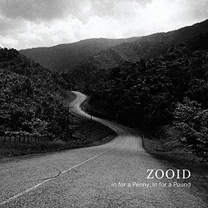April 7, 2017
Threadgill's Non-Idiomatic Improvisation in Knoxville
 As part of the 2017 edition of the Big Ears Music Festival, on Sunday, March 26, 2017, Henry Threadgill's quintet, Zooid, performed at the Bijou Theater in Knoxville, Tennessee. The performance was not billed with any particular title, but a listening comparison between the live show and the studio recordings indicates that the performance was a version of “In for a Penny, In for a Pound”.
As part of the 2017 edition of the Big Ears Music Festival, on Sunday, March 26, 2017, Henry Threadgill's quintet, Zooid, performed at the Bijou Theater in Knoxville, Tennessee. The performance was not billed with any particular title, but a listening comparison between the live show and the studio recordings indicates that the performance was a version of “In for a Penny, In for a Pound”.
Henry Threadgill was an early member of the Association for the Advancement of Creative Musicians (AACM) in Chicago. He is a flautist and a saxophonist. In the 1970's and 1980's, he performed as part of the ensemble, Air with bassist, Fred Hopkins, and drummer, Steve McCall. He continued to make music through-out the twentieth century. A favorite of ours at the Poison Pie Publishing House is Threadgill's Song Out of my Trees released on Black Saint Records in 1994. Since the turn of the century, his ensemble, Zooid, has existed in one form or another. Constant in the line-up are Threadgill on flutes and saxophone, Jose Davila on trombone and tuba and Liberty Ellman on guitar. Elliot Humberto Kavee has performed on drums in the group for more than a decade. The quintet present at this concert was completed by Christopher Hoffman, a cellist, who has been a part of Zooid for at least five years.
 We purchased a one-day (Sunday) pass to the Big Ears Music Festival specifically to see Henry Threadgill perform. We were not disappointed. The ensemble played a kind of music that combined elements of composition and improvisation. It sounded jazz-like, but only in a recognition of the roots of the music. The elements of composition and the unusual choice of instrumentation (especially the cello and the tuba) imbued it with overtones reminiscent of contemporary classical music. In the end, the music was both or neither, or perhaps indifferent to these labels. Davila, the tubist, in particular made his presence known in a way that one doesn't associate with jazz. He added a lumbering counterpoint to the otherwise fleet music that was new to this ear.
We purchased a one-day (Sunday) pass to the Big Ears Music Festival specifically to see Henry Threadgill perform. We were not disappointed. The ensemble played a kind of music that combined elements of composition and improvisation. It sounded jazz-like, but only in a recognition of the roots of the music. The elements of composition and the unusual choice of instrumentation (especially the cello and the tuba) imbued it with overtones reminiscent of contemporary classical music. In the end, the music was both or neither, or perhaps indifferent to these labels. Davila, the tubist, in particular made his presence known in a way that one doesn't associate with jazz. He added a lumbering counterpoint to the otherwise fleet music that was new to this ear.
As for Threadgill, he played flute, bass flute and saxophone at different times during the performance. In general, he began with flute and ended with saxophone. The pieces which included saxophone were more likely to set the audience bopping around in the plush seats of the Bijou Theater. Sometimes, Threadgill did not play at all. At these times, Threadgill, born in February 15, 1944, danced about on stage. We are happy to report he is an excellent dancer. If you can't envision how seventy-three year-old men dance, then that is just one more reason to seek out a performance.
People attend musical performances with a variety of expectations. For this concert, we anticipated nothing less than unequivocal excellence in whatever form it took. We wanted to hear a music that we could not have heard anywhere else generated by anyone else and that is what was delivered--a species of non-idiomatic improvisation pleasing to both the physical senses and the mental sensibilities.
We note as an afterthought that “In for a Penny, In for a Pound” received the Pulitzer Prize for music in 2016. When most people are informed of this, the common response is, "There is a Pulitzer Prize for music?" That the award is poorly known is not by accident. Wikipedia notes, “After winning the Pulitzer in 2003, John Adams expressed "ambivalence bordering on contempt" because "most of the country's greatest musical minds" have been ignored in favor of academic music.”
In a final aside, another of Henry Threadgill's groups, Ensemble Double Up, also includes Ellman, Davila and Hoffman along with several others. Their 2016 release, Old Locks and Irregular Verbs, made our list of favorite records released in 2016.

